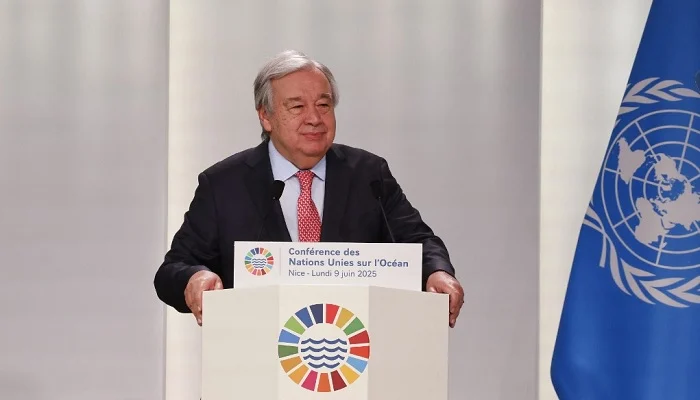United Nations Secretary-General Antonio Guterres declared on Monday that the world cannot permit the deepest oceans to “become the wild west,” marking the commencement of a global summit on marine issues in France.
World leaders are converging at the UN Ocean Conference in Nice, amidst ongoing international disagreements regarding contentious rules for deep-seabed mining of critical minerals and the terms of a global treaty on plastic pollution.
US President Donald Trump has injected urgency into the deep-sea mining debate by moving to fast-track US exploration in international waters, effectively sidestepping global efforts to regulate this nascent sector.
The International Seabed Authority, which possesses jurisdiction over the ocean floor beyond national waters, is scheduled to convene in July to discuss a global mining code aimed at regulating mining activities in the ocean depths.
Guterres voiced his support for these negotiations and urged caution as countries navigate these “new waters on seabed mining.”
“The deep sea cannot become the wild west,” he stated, drawing applause from the plenary floor.
Many nations express opposition to seabed mining, and France is hopeful that more countries will join a moratorium until a more comprehensive understanding of the practice’s ecological impacts can be achieved.
French President Emmanuel Macron declared that a moratorium on deep-sea mining was “an international necessity.”
Wave of Commitments
“I think it’s madness to launch predatory economic action that will disrupt the deep seabed, disrupt biodiversity, destroy it and release irrecoverable carbon sinks — when we know nothing about it,” the French president stated.
In subsequent remarks, met with thunderous applause, he asserted that the deep sea, Greenland, and Antarctica were “not for sale.”
Macron announced that a global treaty designed to govern the high seas had garnered sufficient ratifications to enter into force and was “a done deal,” though he did not specify a timeline.
The agreement, struck in 2023, required ratifications from 60 signatory countries to become international law. Macron confirmed that the necessary numbers “had been reached, which allows us to say that the high seas treaty will be implemented.”
Further commitments on ocean conservation are anticipated on Monday in Nice, where approximately 60 heads of state and government are joining thousands of business leaders, scientists, and civil society activists.
On Monday, the United Kingdom is expected to announce a partial ban on bottom trawling in half of its marine protected areas, thereby placing this destructive fishing method squarely on the summit’s agenda.
Bottom trawling involves dragging immense fishing nets across the ocean floor, indiscriminately sweeping up everything in their path—a process shockingly depicted in a recent documentary by British naturalist David Attenborough.
Greenpeace welcomed the UK’s announcement on trawling but, in a statement, deemed it “long overdue.”
Words into Action
Macron reiterated that a global pact to protect marine life in international waters had received sufficient support to become law and was “a done deal.”
The High Seas Treaty, concluded in 2023, requires ratifications from 60 signatory countries to enter into force—a target France had aimed to achieve prior to the Nice summit.
Macron reported that about 50 nations had ratified the treaty, with an additional 15 formally committing to join them.
This “allows us to say that the high seas treaty will be implemented,” he affirmed.
Other commitments are expected on Monday in Nice, where around 60 heads of state and government have gathered with thousands of business leaders, scientists, and civil society activists.
On Monday, the United Kingdom is anticipated to announce a partial ban on bottom trawling in half of its marine protected areas, directly addressing this destructive fishing method on the summit agenda.
Bottom trawling entails the indiscriminate dragging of huge fishing nets across the ocean floor, a process graphically illustrated in a recent documentary by British naturalist David Attenborough.
Macron had stated on Saturday that France would restrict trawling in some of its marine protected areas, but environmental groups criticized this measure as not going far enough.
On Sunday, French Environment Minister Agnes Pannier-Runacher hinted at “important announcements” in Nice regarding the establishment of new marine protected areas.
Samoa took the lead this past week, announcing that 30% of its national waters would be placed under protection with the creation of nine new marine parks.
Currently, only 8% of global oceans are designated for marine conservation, despite a globally agreed target to achieve 30% coverage by 2030.
However, even fewer are considered truly protected, as some countries impose minimal rules on what is forbidden in marine zones or lack the financial resources to enforce existing regulations.
Nations at the summit will face calls to contribute the missing finance for ocean protection initiatives.
Small island states are expected to attend the summit in significant numbers to demand financial and political support to combat rising sea levels, marine pollution, and the depletion of fish stocks.
The summit will not conclude with a legally binding agreement, unlike a climate COP or treaty negotiation.
Nevertheless, diplomats and other observers expressed that if leaders seized the opportunity, the summit could mark a much-needed turning point in global ocean conservation.
“We say to you, if you are serious about protecting the ocean, prove it,” stated President Surangel Whipps Jr. of Palau, a low-lying Pacific nation.



